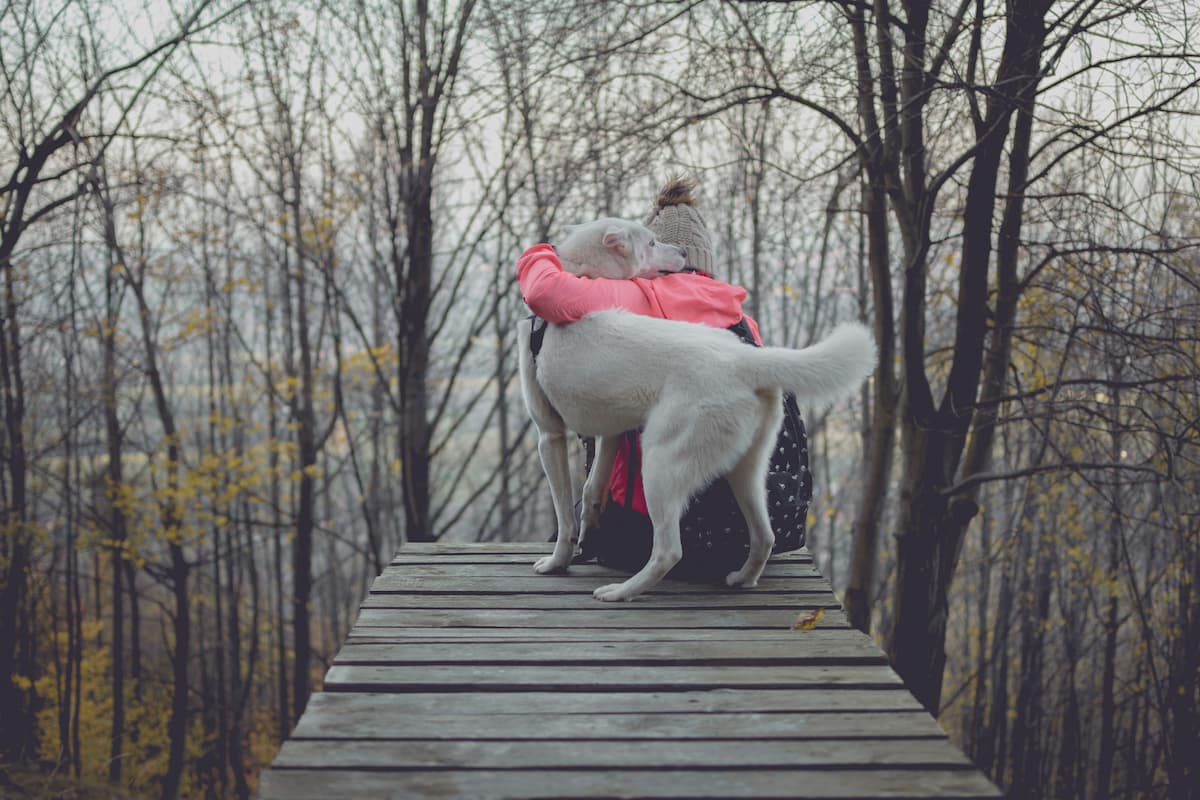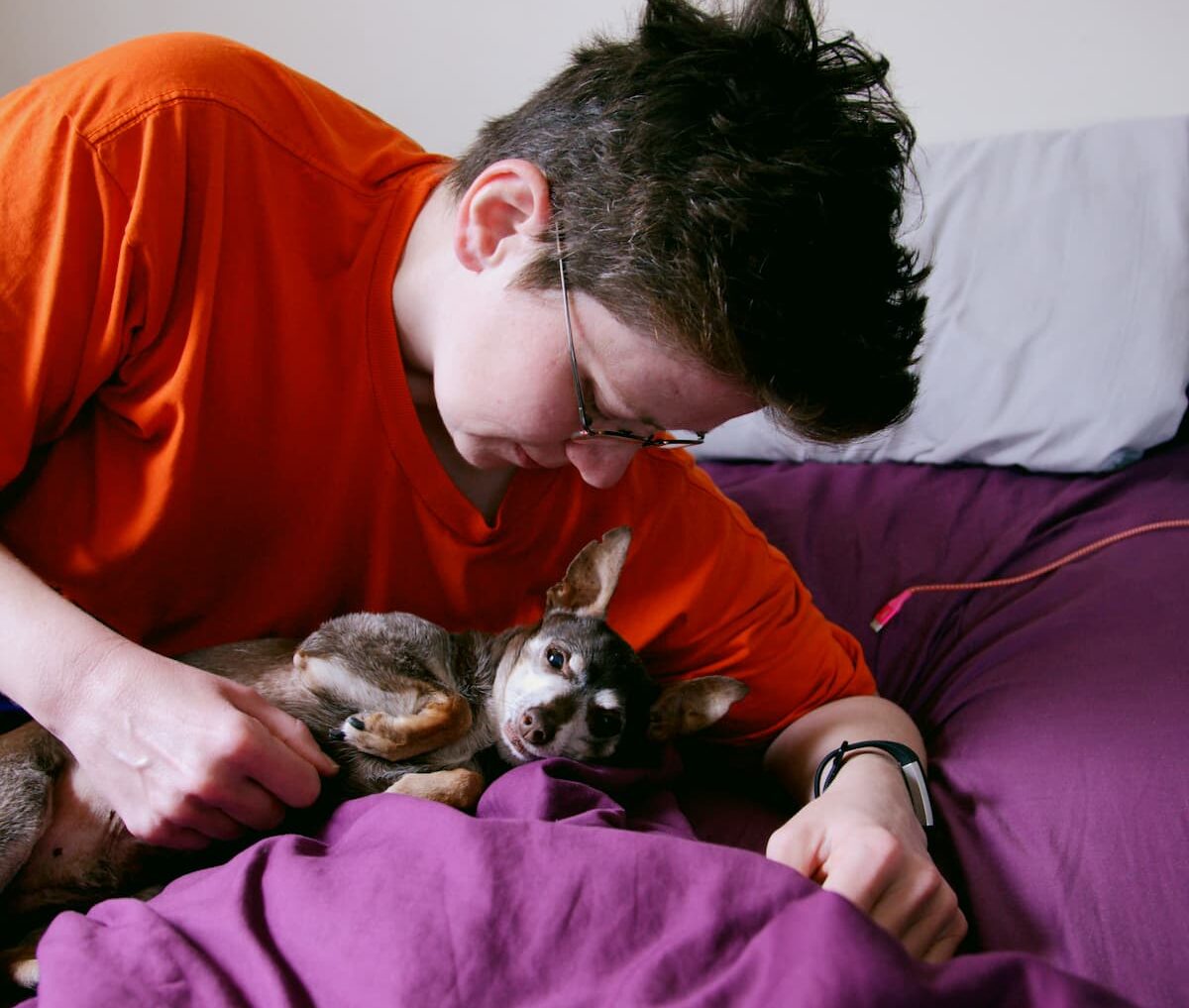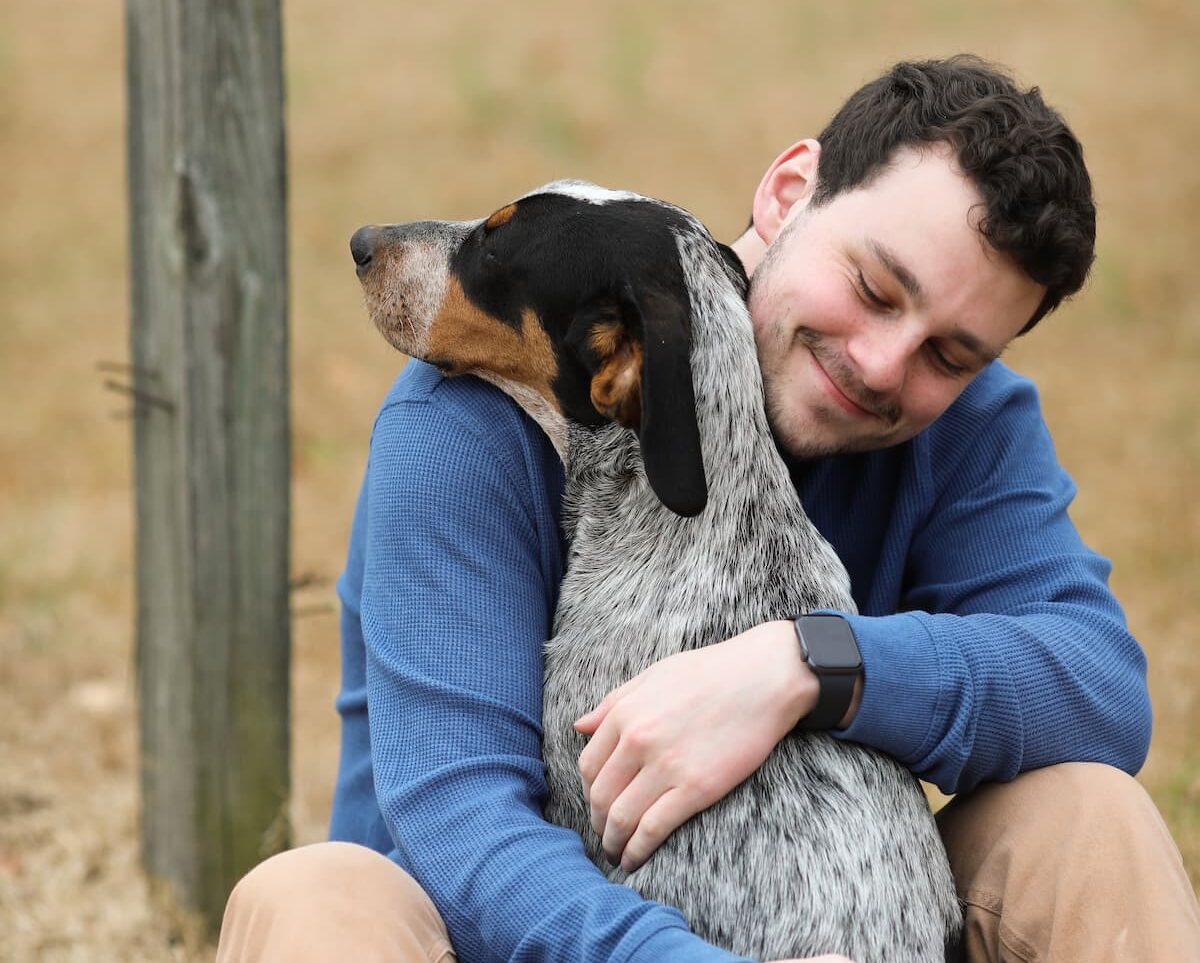Picture this: You’ve just sat down to enjoy a quiet moment alone, perched on the comfiest spot on your couch.
The soothing melody of your favorite song fills the air, gently caressing your ears.
Just as you feel the stresses of the day melt away, you notice a familiar pair of eyes fixated on you.
It’s your four-legged companion, wagging its tail with that unmistakable look of adoration.
You can’t help but wonder, why does my dog always want to be close?
This article shall explore why man’s best friend has an insatiable desire to seek our affectionate embrace.
Why Dogs Crave Close Relationships
Whether it’s with their human family members or fellow furry friends, dogs have a strong need for companionship.
This innate desire for socialization can be traced back to their ancestral roots as pack animals.
1. Instinctual Pack Mentality: Dogs are descendants of wolves, who lived in tight-knit packs, relying on each other for survival.
Being part of a pack meant safety, hunting efficiency, and a better chance of survival.
This pack mentality is deeply ingrained in their DNA, and when they become part of our families, they see us as their new pack.
Just like in the wild, being close to their pack members makes them feel safe, secure, and loved.
So, when your dog curls up next to you or rests their head on your lap, it’s their way of showing their loyalty and trust.
2. Emotional Bonding: Dogs experience a wide range of emotions, including joy, fear, and empathy.
They rely on social bonds to fulfill their emotional needs and feel a sense of security.
By being close to their loved ones, dogs feel protected and loved, which ultimately enhances their overall well-being and happiness.
From the moment we bring them home, they form an emotional bond with us that only strengthens over time. They crave our company and are genuinely happy when they are near us.
Our presence doesn’t just reassure our dogs, it also releases oxytocin (also known as the “love hormone”) into their bodies, strengthening the bond between dogs and their caregivers.
3. The Importance of Scent: Dogs have an incredibly keen sense of smell, and they use it to connect with others.
When a dog sniffs a person or another animal, they are gathering important information about their identity, emotions, and even health conditions through pheromones.
By being close to their loved ones, dogs are able to constantly exchange scents, reinforcing their social bonds and creating a sense of familiarity and trust.
So, when your dog nuzzles their nose against you or lays their head on your chest, it’s a subtle way of saying, “I know you, and I want to be near you.”
The Role of Domestication in Dogs’ Need for Closeness
Thousands of years ago, our ancestors began domesticating dogs, and through this process, dogs have developed a strong bond with humans.
They have become highly social animals who thrive on human interaction and companionship.
When dogs were first domesticated, they were used for various purposes such as hunting, guarding, and herding.
As a result, they learned to rely on humans for survival and became dependent on us for their basic needs.
This dependency on humans has shaped their behavior and created a deep emotional connection between dogs and their owners.
Furthermore, domestication has also influenced the genetic makeup of dogs, leading to the development of certain traits that make them more inclined to seek closeness with humans.
For example, dogs have been selectively bred for friendliness and sociability over the years, which has further strengthened their desire to be close to us.
They have learned that being near humans not only provides them with safety and protection, but also love, attention, and a sense of belonging.
Understanding the Emotional Benefits of Close Proximity for Dogs
As mentioned above, dogs are social animals that crave our companionship, and this closeness provides several benefits for our pets’ health:
Sense of Security: Dogs are pack animals by nature, and their ancestors relied on the safety and security of the pack for survival. When a dog is close to its humans, it experiences a sense of security and comfort.
The familiar scent, touch, and presence of their human creates a secure environment, making them feel protected and loved.
This proximity helps to alleviate any anxieties or fears they may have, leading to a happier and calmer pup.
Reduced Stress and Anxiety: Just like humans, dogs can experience stress and anxiety.
Whether it’s separation anxiety, fear of loud noises, or general nervousness, being in close proximity to their humans can help alleviate these emotions. The soothing presence of their human acts as a natural stress reliever, providing them with a sense of calm and reassurance.
This can be especially beneficial during stressful situations such as thunderstorms or visits to the vet.
Strengthened Bond and Social Connection: Dogs are highly social animals and thrive on companionship.
When they are in close proximity to their humans, they feel a stronger bond and connection with them.
This bond is not only important for their emotional well-being but also helps in obedience training and overall behavior.
Being close to their humans allow dogs to observe, mimic, and learn from their human’s actions, leading to a well-adjusted and obedient companion.
Tips to Foster a Stronger Bond with Your Dog
Understanding Your Dog’s Instinctual Nature
One of the reasons why dogs always want to be close to their owners is their instinctual nature.
As noted above, dogs are social animals, and they naturally seek the companionship and security provided by their human pack.
They have a strong desire to be part of the family unit and feel a sense of belonging.
This instinctual need for closeness is reflected in their constant desire to be by our side, whether it’s sitting at our feet or cuddling up with us on the couch.
To foster a strong bond and closeness with your furry companion, it’s essential to understand and respect their innate instincts.
Spend quality time with your dog every day, engaging in activities that strengthen your bond.
This could include going for long walks, playing interactive games, or simply snuggling together.
By fulfilling their need for companionship, you’ll create a sense of security and reinforce your role as their trusted pack leader.
Nurturing Your Relationship through Positive Reinforcement
Building a strong bond with your dog goes beyond meeting their physical needs — it also involves nurturing your relationship through positive reinforcement.
Dogs thrive on praise and rewards, so use positive reinforcement techniques to encourage behaviors that promote closeness and reinforce the bond between you and your furry friend.
When your dog displays desirable behavior, such as coming when called or calmly resting beside you, praise them lavishly and offer treats or their favorite toy as a reward. This positive reinforcement will strengthen the association between being close to you and receiving positive experiences.
Remember to be consistent and patient with your training efforts, as dogs learn best through repetition and positive reinforcement.
Creating a Safe and Comfortable Environment
To foster a strong bond with your dog, it’s vital to create a safe and comfortable environment where they feel secure and at ease.
Just like humans, dogs appreciate a cozy and welcoming space where they can relax and be themselves.
Ensure your pup has a designated area within your home that is their personal haven.
Provide a comfortable bed, toys, and a water bowl in this space.
Additionally, make sure your home is dog-proofed to avoid any potential hazards that could cause anxiety or harm.
By creating a supportive and stress-free environment, you’ll cultivate a deep sense of trust and closeness between you and your furry companion.
Recognizing when our Dogs’ Desire for Closeness Might cause Problems
Whether they’re nuzzling up against us on the couch or curling up at our feet, their desire for closeness is undeniable.
But while it’s true that dogs are naturally social animals, there are times when their desire for closeness might indicate potential issues.
Here are a few signs to look out for:
- Increased clinginess: If your dog has suddenly become more clingy than usual, constantly seeking physical contact or always wanting to be by your side, this could be a sign of anxiety or fear. Dogs can become overly dependent on their owners when they are feeling stressed or unsure about something.
- Unusual aggression: While aggression in dogs can have many causes, an increase in possessive or territorial behavior could be linked to their strong desire for closeness.
If your dog is becoming overly protective of you or their personal space, it’s important to address this behavior and consult with a professional trainer or veterinarian.
- Excessive demand for attention: Dogs that constantly demand attention, whether it’s through pawing, barking, or nudging, may be signaling an underlying issue.
This behavior could indicate boredom, lack of mental stimulation, or even separation anxiety.
It’s crucial to provide them with appropriate outlets for their energy and seek professional advice if necessary. While it’s natural for dogs to want to be close to their owners, it’s important to recognize when this behavior might be a red flag.
Monitoring their overall behavior, understanding their specific needs, and seeking professional help when needed, ensures that our canine friends are happy, healthy, and well-adjusted.
FAQ
Q: Why do dogs seek closeness with their humans?
A: Dogs are known for their unconditional love, and their desire to be close to us stems from their natural pack instincts.
They view us as their family, their pack leaders, and being close to us brings them a sense of security and comfort.
Q: So, it’s all about finding security and comfort?
A: Absolutely! Dogs rely on us for safety and emotional reassurance.
By being close to us, they feel protected and connected.
They look to us for guidance, and being able to stay close allows them to feel more at ease with their surroundings.
Q: Is it only about survival instincts or are there other reasons?
A: While survival instincts play a role, it goes beyond that.
Dogs are social animals, and their desire for companionship is deeply ingrained in their nature.
They thrive on social interaction, and being near their humans fulfills this need for connection.
Q: Are there any specific benefits for dogs that want to be close?
A: Absolutely! When dogs are close to us, their stress levels decrease, and their overall well-being increases.
Just like us, they release happy hormones when they’re in close proximity to their loved ones.
It’s a win-win situation for both dogs and humans! Q: Is there a difference in the desire to be close among individual dogs?
A: Indeed, there is.
Just like humans, each dog has their own personality and preferences.
Some dogs are naturally more independent and may not seek as much closeness, while others are more predisposed to want constant physical contact. It varies from dog to dog.
Q: Can we reinforce this desire for closeness in our dogs?
A: Absolutely! Building a strong bond with your furry friend involves spending quality time together, whether it’s through cuddles, walks, playtime, or even training sessions.
By nurturing your relationship, you can strengthen their desire to be close and create a shared sense of trust and affection.
Q: Are there any situations where dogs may want more space and not be as clingy?
A: Just like humans, dogs may experience moments when they need their own personal space.
It could be due to feeling unwell, tired, or simply needing some downtime.
It’s important to respect their boundaries at these times and allow them the space they need to recharge.
Q: How can we strike a balance between closeness and providing them space?
A: The key lies in understanding your dog’s cues and body language.
Pay close attention to their signals and give them the space they need when they appear more reserved.
It’s all about finding the right balance that allows you to enjoy their companionship while respecting their individual needs.
Q: Any final thoughts on the wonderful love dogs show us by always wanting to be close?
A: Dogs truly hold a special place in our hearts, don’t they? Their desire to be close is a testament to the love and loyalty they hold for us.
So next time your furry friend snuggles up next to you, embrace the warmth and cherish the beautiful bond that only a canine companion can bring.
Closing Remarks
So there you have it, the curious behavior of our furry friends explained.
Our little puppies, with their wagging tails and soulful eyes, always seem to seek out our company and want to be close.
But hey, who can blame them? We humans have the good fortune of experiencing their unconditional love and loyalty.
From their perspective, we are their pack, their family, and they just can’t get enough of us! Whether it’s their innate desire for companionship, their instinct to protect, or simply their warm and fuzzy love, dogs constantly remind us of the beauty of a close and loving bond.
So next time you find your pup snuggling up next to you on the couch, cherish that moment, because it’s their special way of saying, “I love you, and I just can’t resist being close to you!”














